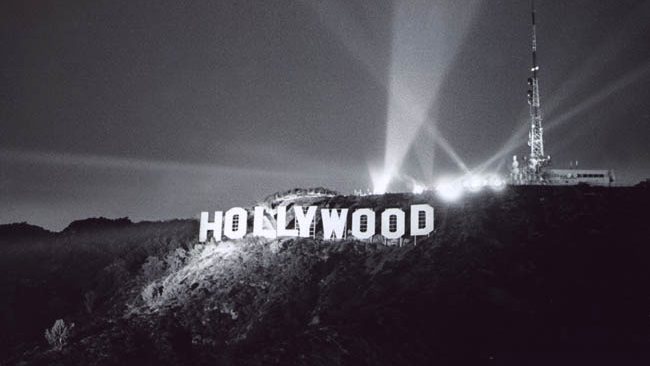HOLLYWOOD—On my way back from Trader Joe’s I saw a Channel 7 van parked expectantly. What newsworthy event had drawn it to this part of Vine, alongside a raffish stretch of the Walk of Fame that brings together an oddball assortment of luminaries that scroll underfoot: from Orson Welles to Yakima Canutt, to many blank stars in waiting, here amid the luminous condos and a degree of hustle bustle that now puts Tinseltown on a par with Philadelphia, if not the Big Apple itself? (Phew, let me catch my breath.)
As he collected gear from within the van, an affable cameraman was explaining to a couple of women on lunch break that Art Linkletter had died. (Hey, I didn’t know he was still alive.) And here he was (the cameraman, not Art Linkletter) to broadcast live with a perky reporter from the Linkletter star, at the corner across from Trader Joe’s.
Like a dog, I scented an opportunity here. Mr. Linkletter’s dusty, naked star—with a fissure between the first ”˜L’ and the brass rim— needed some decoration. On the Savings and Loan corner with its Caesars Palace-like, white marble bank boasted a beautiful flower bed lousy with orange trumpet lilies. I plucked one stealthily. Prey to paranoid imaginings of incarceration for floral theft, I imagined a parking attendant would give me the business. But nobody was on duty.
I unapologetically sauntered back up Vine, trumpet flower in hand. It was a fluted thing, the molten orange of the California poppy, the orange of a Tibetan monk’s robe. This floral offering I would lay on the nonagenarian’s cracked, mica-speckled star—the opening salvo of a floral avalanche, tributes from those heartbroken at Art Linkletter’s passing. There would be photos on Internet and TV reports and I could point proudly out that my alter-ego, Mayor Hollywood, left the first flower.
As I approached, the cameraman was hunkered down, connecting his cables. “I’m Mayor Hollywood,” I said, feeling cocksure. “Tell ”˜em I left the flower. Mayor Hollywood, Grady Miller.”
“That was nice of you,” said the cameraman, duly impressed by my credentials.
“I trust I can count on your vote in the next election. You know, the race is between me and Angelyne. Monty Hall’s name was floated as a contender, but that was a red herring.”
“I’m sorry,” the cameraman cut me off. “I have to get on the air.”
“That’s O.K. I’m a pro, too,” I said. “I know what it means to be in a hurry. I’ve buttonholed Angelyne in the 99 cent store about maybe sharing mayoral duties, but she’s hard to pin down.”
“Gotta run,” the cameraman said, breaking into flop sweat.
How rude! How terribly rude to the honorary interim Mayor of Hollywood. Well, hooray for us! Such world class surliness only in Hollywood, and where else to you turn a death of someone, who retired from the airwaves before a third of living Americans had been born, into a chance for political exposure? There are no wholly bad deaths in Hollywood. Take the fictional example of the washed-up movie cowboy in Fitzgerald’s “The Last Tycoon”:
“’Old’ Johnny Swanson stood on the corner in his semi-cowboy clothes, staring gloomily past the moon. Once he had been as big in pictures as Tom Mix or Bill Hart—now it was too sad to speak to him”¦”
By the end of the book there’s a mix-up that jump starts the forlorn Johnny’s career. He is mistakenly placed as one of the studio mogul’s pall bearers, people see him, a producer wants to cast him, a stalled career starts anew. Indeed, show business takes no holiday for death. You’ve got to love it: people network, deals are made, careers rekindled. In death is the angel of merchandising; in early death, immortality; in Art Linkletters’ death, the impetus for Mayor Hollywood to establish a tradition of first flowers on the stars of the newly deceased. In the meantime, I promise to faithfully continue the mayoral policy of giving away whoopee cushions and spreading mirth wherever I go.






